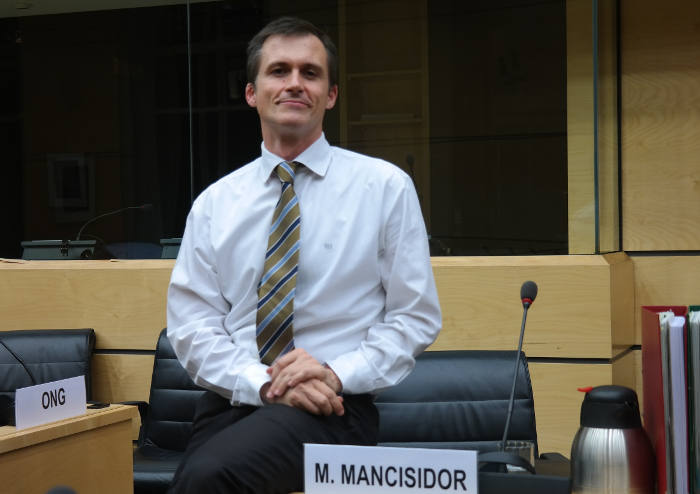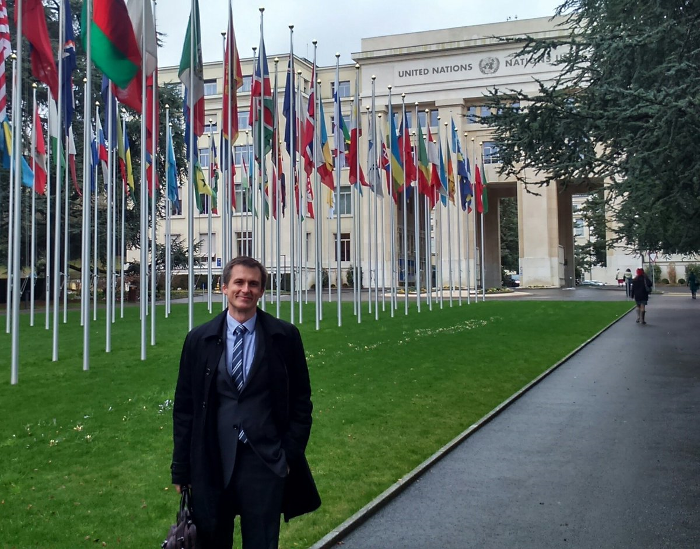-
30 May 2016
Category : Interview
‘The results in the defence of economic, social, and cultural rights have been significant’
We interview Mikel Mancisidor, a member of the UN Committee on Economic, Social and Cultural Rights (CESCR) and a FIIAPP expert in Morocco.
 Mikel Mancisidor
Mikel MancisidorMikel Mancisidor is a member of the United Nations Committee on Economic, Social and Cultural Rights (CESCR). Re-elected for the 2017-2020 term, he is working with 17 other independent experts to monitor States’ application of the International Covenant on Economic, Social and Cultural Rights, one of the principal international human rights treaties.
In this interview, Mikel Mancisidor talks to us about the committee’s work and his day-to-day activities.
What is the purpose of the UN Committee on Economic, Social and Cultural Rights?
It is a body charged with monitoring and supervising compliance on the part of States with the obligations they have assumed in ratifying the International Covenant on Economic, Social and Cultural Rights.
Or, to put it more simply, the International Human Rights System has various treaties, and perhaps the broadest two are the best known: the Covenant of 1966, which includes Civil and Political Rights, and the Covenant on Economic, Social and Cultural Rights. Each of these covenants has its own committee, and these committees have the mission of supervising compliance by the States with their international obligations.
The States, by ratifying these covenants, or treaties, in addition to signing other treaties—such as on the rights of children, the situation of women and the disabled, or against torture—commit to reporting to the United Nations, normally every five years and through a periodic report, on how they are progressing in terms of compliance with these obligations. The committee’s function is to analyse these reports, engage in dialogue with the State to verify that this progress is taking place, certify States that have advanced in some area, and ones that haven’t, identify work that still remains to be done, and issue recommendations, etc.
In addition to this main function, which involves the periodic reports, the dialogue with the States and the publication of the conclusions and recommendations, since the entry into force of the additional protocol to our covenant, there is a new function, which is to study individual communications.
How many people are on the Committee?
In our case, the committee is made up of 18 international members from all over the world.
What is your typical day like, your role on the committee?
The committee’s working system is through the study of the periodic reports submitted by the States, and the most important moment in the work of the committee is the dialogue with the States. Every five years, a State delegation comes to the UN, in Geneva, which is where the Committee is based, and presents is periodic report on the situation of economic, social, and cultural rights in its country and the progress made towards compliance with its obligations during these years.
We study the report, consult other sources of information from international bodies, NGOs, universities, ombudsman’s offices, etc. And with all of this information, we spend an entire day in dialogue with the State, during which we study its compliance with its obligations and question the State with respect to the points in which compliance has been unsatisfactory. Following this dialogue with the States, we prepare a document internally, which is the document of conclusions and recommendations to the State for the next five years.
What advances have been made since the approval of the Committee?
The advances, in my opinion, are very significant. This year marks the 50th anniversary of the adoption of these covenants. In these fifty years, there as been very significant progress in the application of economic, social, and cultural rights around the world. Even in recent years, in which we have experienced a very major period of crisis, during which the countries in our sphere are living through a very difficult situation of economic crisis with a resulting loss of standards in both labour and economic and social matters. We mustn’t lose the overall perspective. The advances have been significant.
Obviously there are countries where this is not the case, countries where the situation has gotten worse. There are failed countries, countries with conflicts in which the situation is horrible and has deteriorated enormously. But, in general, the situation of economic, social, and cultural rights in the world is getting better little by little. If we think in terms of access to food, health, and water, for example.
Then, from a more technical standpoint, the international systems for promoting and protecting these rights have also improved. A few years ago, it would have been unthinkable that economic, social, and cultural rights could be protected internationally by means of individual communications. In other words, individual complaints.
Nonetheless, in 2008 the Additional Protocol to the Covenant on Economic, Social and Cultural Rights was adopted, allowing the submission of individual complaints for the first time in history. For the countries that have ratified this protocol, Spain among them, it is now possible to submit individual complaints for violations of these types of rights. And in fact, in another committee, we have already received various complaints from Spain and have resolved some of them.

Mikel Mancisidor What is meant by Economic, Social and Cultural Rights?
The Universal Declaration of Human Rights of 1948 contained the list of rights and a comprehensive vision in which the rights were seen as interdependent. For historic reasons this led to a system of two international treaties that separated civil and political rights from economic, social and cultural rights. The latter group corresponded to a later tradition. For example, the right to health and education, labour rights, rights to a minimum standard of living and food, water, housing, cultural rights, etc.
How does one become a member of the committee?
The experts are chosen based on the basis of geographic criteria. In other words, the 18 members are chosen based on a regional distribution, so that there are, for example, four members from Western Europe, four from Eastern Europe, four Africans, four Asians, etc. The members of these committees, this one in particular, are chosen by the United Nations Economic and Social Council, in New York, and every two years a vote is held to replace part of this committee.
The States nominate the candidates, and the Member States of the international community vote for the ones they consider most suitable.
Mikel Mancisidor, is a member of the Committee on Economic, Social and Cultural Rights (CESCR) and a FIIAPP expert in the ‘Strengthening Human Rights in Morocco‘ project
The views and opinions expressed in this blog are the sole responsibility of the person who write them.






